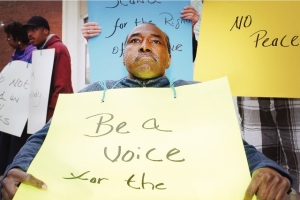Supporters: Program needs better quarters
By John Joyce
Published in News on March 17, 2013 1:50 AM

News-Argus/MICHAEL BETTS
Ronnie Hinnant listens to his sister, Cynthia, chant during a protest on James Street Saturday. Those who gathered want officials to reconsider a move for the HOPE program to a new facility.
It is called the HOPE program.
For the mentally and physically disabled adult men and women the Wayne Opportunity Center program provides jobs for, it is a second home.
Now they are being told they have to move.
Protesters gathered by the dozens Saturday outside the Eastpointe Building at 100 James St., to voice their opposition to a move they say will be detrimental to their special needs friends and family members.
Recent staff and budget cuts have threatened the stability of the state-funded adult developmental and vocational program, currently in the process of being relocated from the old Wayne Community College to a recycling plant run out of a warehouse on George Street.
State funding cuts as well as continuing financial concerns within the organization contributed to the decision to downsize, to relocate and to cut staff, WOC officials say.
And those who support the clients served there are worried about what will happen next.
"We're very concerned this will have a profound effect on their health," advocate James Hinnant said.
Hinnant is a retiree, a Goldsboro native who moved back to the city after 34 years in D.C. to care for his mentally challenged brother. He is also a Vietnam veteran who returned home from the war injured, and said he knows what it is like to be cast aside.
"We have to be advocates and bring attention to this disaster. We're not going to allow our loved ones to be harmed,' he said.
Hinnant said 18 care professionals, many of them either licensed or otherwise certified, have been let go. The ratio of caregivers to clients, he said, is now 10 to one.
Safety was the main concern voiced by protesters Saturday. They said that the air quality and overall conditions of the warehouse were unsuitable, especially for people with the various health issues shared by their loved ones.
Corey Best has asthma and issues with mobility. It is hard for him to maintain balance, his mother said. Best, 24, is mentally disabled and has been a part of the HOPE program for three years.
"It's not that good," he said about the move to the warehouse. He is happy with the way things are and has learned to set goals for himself.
His mother and father are very concerned for his welfare. They fear that such a drastic change is going to disrupt his and the other program member's stability.
People with the types of disabilities Corey and his friends have require structure and routines, a safe environment.
"Think about it," Corey's father said, "you go from sitting one day in a classroom, next day you are in a recycling center."
Community members, too, came out to support the group.
Terrie Artis works for a group home run by Grantham Family Care. She said she joined the protesters wearing signs and waving to passing cars to bring attention to the impact these budget cuts have on real people.
"If they continue to cut the funding, these guys won't have a place to be. They won't be able to go on outings, to eat," Ms. Artis said. "We're standing up for our rights, for their rights."
She said that, although these individuals are disabled, they realize they have needs, and they are aware of what is going on.
Hinnant promised to continue to call attention to the situation. After leading the protest Saturday, he will return his attention to a letter-writing campaign already under way.
"We're taking this to the state and federal level," he said.
Hinnant has written letters to legislators questioning the budget cuts in an effort to turn their attention from the fiscal numbers to the number of real people being impacted.
"The people out here today know how it's going to affect their loved ones. We're talking about transportation, familiarity, the confusion. A lot of them are not going to be able to manage it well," he said.
He equated the warehouse the program is moving into to a dungeon, citing numerous health and safety hazards such as chemicals, furniture stripping agents and the cleanliness of the antiquated building.
"They don't care. It's all about the money. It's not that they're short of funds, this is about the money they are making off the backs of our loved ones."
